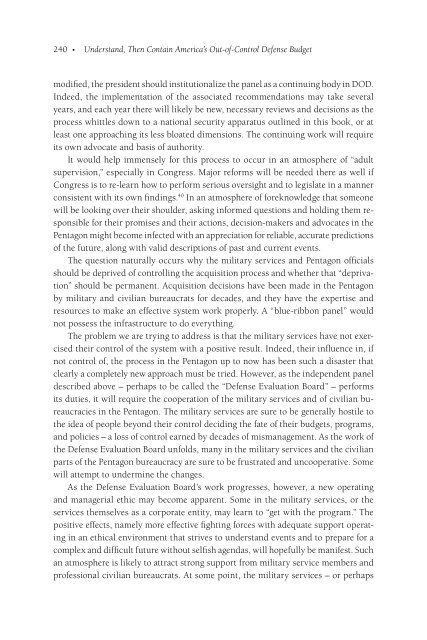Americas Defense Meltdown - IT Acquisition Advisory Council
Americas Defense Meltdown - IT Acquisition Advisory Council
Americas Defense Meltdown - IT Acquisition Advisory Council
You also want an ePaper? Increase the reach of your titles
YUMPU automatically turns print PDFs into web optimized ePapers that Google loves.
240 • Understand, Then Contain America’s Out-of-Control <strong>Defense</strong> Budgetmodified, the president should institutionalize the panel as a continuing body in DOD.Indeed, the implementation of the associated recommendations may take severalyears, and each year there will likely be new, necessary reviews and decisions as theprocess whittles down to a national security apparatus outlined in this book, or atleast one approaching its less bloated dimensions. The continuing work will requireits own advocate and basis of authority.It would help immensely for this process to occur in an atmosphere of “adultsupervision,” especially in Congress. Major reforms will be needed there as well ifCongress is to re-learn how to perform serious oversight and to legislate in a mannerconsistent with its own findings. 40 In an atmosphere of foreknowledge that someonewill be looking over their shoulder, asking informed questions and holding them responsiblefor their promises and their actions, decision-makers and advocates in thePentagon might become infected with an appreciation for reliable, accurate predictionsof the future, along with valid descriptions of past and current events.The question naturally occurs why the military services and Pentagon officialsshould be deprived of controlling the acquisition process and whether that “deprivation”should be permanent. <strong>Acquisition</strong> decisions have been made in the Pentagonby military and civilian bureaucrats for decades, and they have the expertise andresources to make an effective system work properly. A “blue-ribbon panel” wouldnot possess the infrastructure to do everything.The problem we are trying to address is that the military services have not exercisedtheir control of the system with a positive result. Indeed, their influence in, ifnot control of, the process in the Pentagon up to now has been such a disaster thatclearly a completely new approach must be tried. However, as the independent paneldescribed above – perhaps to be called the “<strong>Defense</strong> Evaluation Board” – performsits duties, it will require the cooperation of the military services and of civilian bureaucraciesin the Pentagon. The military services are sure to be generally hostile tothe idea of people beyond their control deciding the fate of their budgets, programs,and policies – a loss of control earned by decades of mismanagement. As the work ofthe <strong>Defense</strong> Evaluation Board unfolds, many in the military services and the civilianparts of the Pentagon bureaucracy are sure to be frustrated and uncooperative. Somewill attempt to undermine the changes.As the <strong>Defense</strong> Evaluation Board’s work progresses, however, a new operatingand managerial ethic may become apparent. Some in the military services, or theservices themselves as a corporate entity, may learn to “get with the program.” Thepositive effects, namely more effective fighting forces with adequate support operatingin an ethical environment that strives to understand events and to prepare for acomplex and difficult future without selfish agendas, will hopefully be manifest. Suchan atmosphere is likely to attract strong support from military service members andprofessional civilian bureaucrats. At some point, the military services – or perhaps


